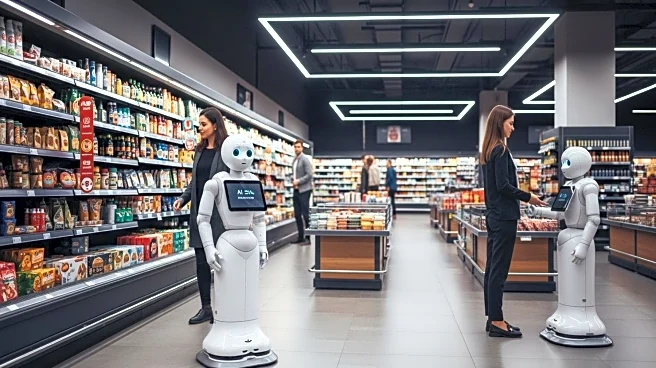What is the story about?
What's Happening?
Jennifer Conklin, Vice President at Capgemini, is advocating for the use of artificial intelligence (AI) in grocery stores to enhance human interaction rather than replace it. Speaking at Groceryshop, Conklin emphasized the importance of using AI to reduce friction for both store teams and shoppers. Her approach focuses on integrating AI into workflows to support store associates with tasks such as providing instant answers, ticketing, and wayfinding through voice headsets. Conklin's strategy aims to make shopping experiences more intuitive and human-centered, rather than automated. She is also exploring AI applications for in-store fulfillment efficiency, such as optimizing routes for employees managing multiple orders. Conklin's vision includes using AI to connect online and in-store experiences, facilitating seamless shopping journeys like recipe-to-cart flows.
Why It's Important?
The integration of AI in grocery stores, as proposed by Conklin, could significantly impact the retail industry by improving operational efficiency and customer satisfaction. By focusing on enhancing human interaction, AI can help store associates perform their duties more effectively, leading to better customer service. This approach could also drive innovation in how products are marketed and sold, potentially reshaping consumer behavior and expectations. The emphasis on human-centered AI solutions aligns with broader industry trends towards personalization and customer-centric services. As AI continues to evolve, its role in retail could expand, offering new opportunities for businesses to differentiate themselves in a competitive market.
What's Next?
Conklin's initiatives may lead to further adoption of AI technologies in the retail sector, with potential collaborations between technology providers and grocery chains. As these technologies are implemented, there may be increased scrutiny on their impact on employment and customer experience. Retailers might need to invest in training programs to ensure employees can effectively use new AI tools. Additionally, as AI systems become more integrated into retail operations, there could be discussions around data privacy and the ethical use of AI in consumer interactions. The success of these initiatives could influence other sectors to adopt similar AI-driven strategies.
Beyond the Headlines
The push for AI in grocery stores highlights a broader trend of digital transformation across industries. This shift raises questions about the balance between technology and human touch in customer service. As AI becomes more prevalent, there may be cultural and ethical considerations regarding its role in everyday life. The challenge will be to ensure that AI enhances rather than detracts from human experiences, maintaining a focus on empathy and personalization. Long-term, the integration of AI could lead to significant changes in how businesses operate and interact with consumers, potentially redefining the retail landscape.
















